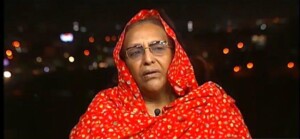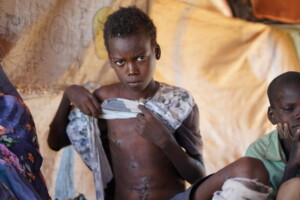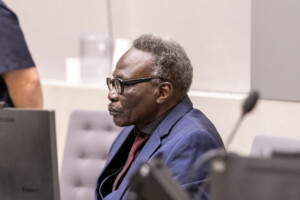Another victim of Ethiopian attack found in eastern Sudan
The number of victims from the Ethiopian attack on the village of Leya, El Gureisha locality in El Gedaref, rose to seven, after a woman’s body was found yesterday in the area of Nahr El Atbrawi.
 El Gedaref governor Suleiman Ali visiting the border area on Monday (SUNA)
El Gedaref governor Suleiman Ali visiting the border area on Monday (SUNA)
The number of victims from the Ethiopian attack on the village of Leya, El Gureisha locality in El Gedaref, on Monday rose to seven, after a woman’s body was found yesterday near the Atbara river.
Ethiopian militiamen launched an attack on Leya on Monday, killing five women and a child while they were harvesting sorghum. A committee formed by those affected by the conflict in El Fashaga reported in a statement yesterday that the body of a seventh woman was found, though at a different place from where the other bodies were found.
The Sudanese Women’s Union condemned the assassination of the women. It called on the government to extend its authority in the border areas and protect its citizens, especially women. They also denounced violence against women, warning that the “tragedies in the west of the country are moving to the east”. They demanded that the government reach a radical solution for the turmoil and the blocking of ports in the east.
Sources from El Gureisha said that farmer Mousa Saleh was kidnapped by Ethiopian militiamen (called shifta in the region) from the area of Abu Zafa, three kilometres south of the town of El Galabat, last Sunday. The militiamen reportedly demand a ransom of SDG 3.5 million in exchange for his release.
Diplomacy
A delegation headed by Sovereign Council member Mohamed El Faki has left for Saudi Arabia today to discuss the situation at the Sudanese-Ethiopian border.
Sovereign Council member Lt Gen Ibrahim Jaber, and the ministers of Foreign Affairs and Defence visited Chadian President Idris Deby yesterday for the same reason. In a press statement following the visit, Jabir indicated that the Chadian President showed “broad understanding” for Sudan’s position.
The United Arab Emirates (UAE) seeks to interven to avoid escalation between Sudan and Ethiopia. In a statement, the UAE’s Ministry of Foreign Affairs stressed the depth and strength of the relations between the UAE and both countries, as well as the need to stop any actions by Sudan or Ethiopia that would increase tensions.
Last week, a Sudanese delegation visited Eritrea to discuss bilateral relations and regional security, including the Ethiopian civil war in the Tigray region bordering both Sudan and Eritrea.
Border
In December, Sudanese army regained control of El Fashaga El Sughra from Ethiopian militiamen who have been occupying and cultivating the fertile Sudanese agricultural lands since 1995. According to the El Fashaga Lands Committee, about 90 per cent of the lands in the border area was occupied for years.
Later that month, four members of the Sudanese army were killed in an attack by Ethiopian army and militia forces. At other border areas, Ethiopian gunmen regularly conduct violent cross-border raids to steal crops and livestock, or abduct people for ransom.
Border demarcation talks between Sudanese and Ethiopian government delegations in Khartoum concluded without an agreement in December. The negotiations reportedly failed because the Ethiopian delegation refused to recognise the 1903 border demarcation, saying that the British-Ethiopian treaty on the border was signed in colonial times.
Since Sudan’s independence in 1956, no clear demarcation of the 1,600-kilometer border with Ethiopia has been made. Military absence has made it easy for Ethiopian militants to occupy fertile farmlands in eastern Sudan.
Radio Dabanga’s editorial independence means that we can continue to provide factual updates about political developments to Sudanese and international actors, educate people about how to avoid outbreaks of infectious diseases, and provide a window to the world for those in all corners of Sudan. Support Radio Dabanga for as little as €2.50, the equivalent of a cup of coffee.












 and then
and then